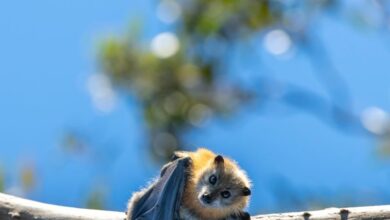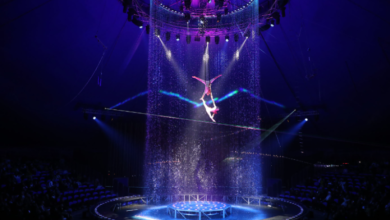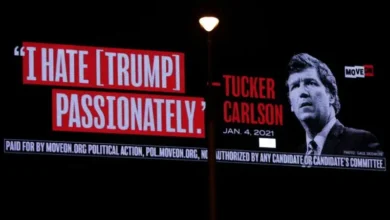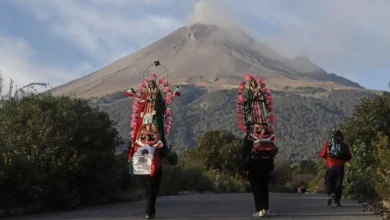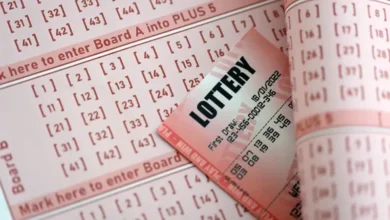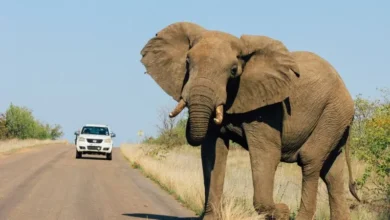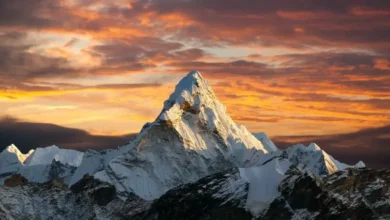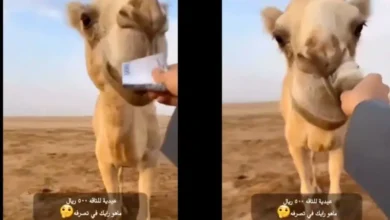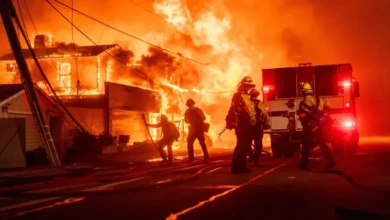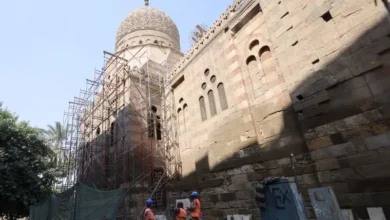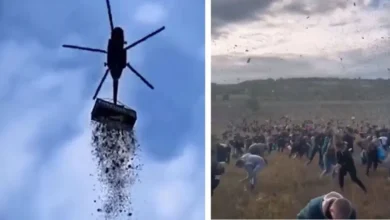Celebrating Palestinian culture: Palestine Writes Festival sparks outrage
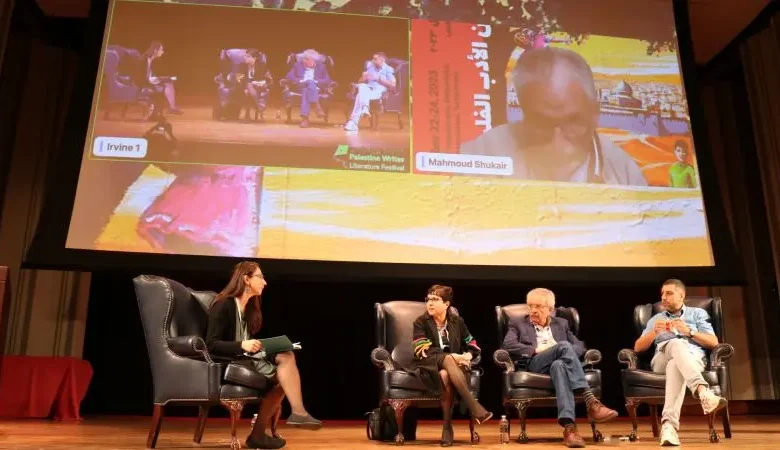
The 2023 Palestine Writes literature festival took place at the University of Pennsylvania in Philadelphia this weekend.
More than 1,500 participants, including authors, artists, publishers, performers, academics, and musicians came together from all across the world to discuss literature, the intersections of culture and power, and the richness of Palestinian history and its future.
A Dabke troupe performing at the opening ceremony of the Palestine Writes Literature Festival. [Salam Bustanji – Al Bawaba]
The festival began with a display of historic photos of Palestine, along with a poem titled “We Never Left” by Susan Abulhawa. Next was a Dabke Dance performance by the Freedom Dabke Group, a series of spoken word performances titled “Love Letters & Defiance” from Dana Dajani, a Palestinian actress and writer as well as Lorna Munro, a poet and member of the Wiradjuri and Gamilaroi Aboriginal groups of Australia.
Palestinian actress and writer Dana Dajani performed a spoken word reading for festival attendees. [Salam Bustanji – Al Bawaba]
The sold-out festival included dozens of panels featuring more than 100 speakers from across the world, including Pulitzer Prize-winning author Viet Thanh Nguyen, Peabody Award-winning journalist Dena Takruri, co-executive producer of the Hulu series Ramy Maytha Alhassen, Arabic Booker Prize winner Ibrahim Nasrallah, celebrated filmmaker Darin Sallam, rock music legend Roger Waters, and dozens more renowned authors, such as Elias Khoury, Huzama Habayeb, Isabella Hammad, Sahar Mustafah, Suad Amiry, Salman AbuSitta, Gary Younge, Nur Masalha, and more.
During the three-day-long festival, the speakers underlined the ancient roots of their culture, advocated for the freedom of the Palestinian people from Israeli occupation, and discussed the current state of journalism in Palestine. The festival also featured a photography and art display, kid-friendly art and craft stations, a treasure hunt, and plant-based Palestinian cuisine.
Panel featuring Mahmoud Shukair, Ibrahim Nasrallah, Mahmoud Muna, Huzama Habayeb and Huda Fakhreddine. [Salam Bustanji – Al Bawaba]
The festival’s emphasis on Palestinian literature and culture has drawn a lot of criticism. Speakers mentioned the difficulties in organizing the sizable crowd. The festival, which is said to be the Largest Palestinian Literature Festival in the continent, took many years in the making. “The seed for the festival began in 2015,” said Palestinian-American writer Susan Abulhawa, followed by listing some of the challenges organizers of the festival faced as they planned the event. “It has been quite a journey to get here. There have been a lot of roadblocks… There are people who can’t bear our expressions of humanity,” said Abulhawa.
Writer and Associate Professor of Arabic Literature Huda Fakhereddine. [Salam Bustanji – Al Bawaba]
Pink Floyd co-founder Roger Waters, who was set to appear at a panel discussion during the festival, was banned from speaking on the University of Pennsylvania campus amid allegations of anti-Semitism. “I was supposed to be taking part in a panel in a couple hours this afternoon, but I’ve been told I’m not allowed into the Irving Arena because they made arrangements for me to attend the panel via Zoom,” Waters recounted. “And the fact that I came here all the way to be present because I care deeply about the issues that are being discussed, apparently cuts no ice with campus police or whoever it is.” Waters attended the panel virtually through Zoom, with his empty chair placed on stage where he was supposed to be sitting along with journalist Gary Younge, who said that his visa was revoked without cause on the day of his flight to Philadelphia.
In the past three weeks, the festival’s organizers received multiple threats from several pro-Israel organizations, including the Anti-Defamation League and the Jewish Federation of Greater Philadelphia. As the festival started, a vehicle with a digital billboard started driving around the campus with photographs of some of the festival’s speakers, labeling them as anti-semites. Several pro-Israel protesters were outside the festival with signs urging passing automobiles to “Honk for Israel.”
Event organizers and participants responded to criticism of the festival, denying the accusations that the event is promoting anti-Semitism and hate speech. “It’s meant to be an intellectual, joyous, and creative space. So many of us have made it our life’s work. With great urgency, we collect the memories of our elders, the pieces from a broken hole we’re desperate to reassemble, the seeds to plant until we can return,” said Susan Abulhawa.
“I was inspired by how inviting everyone was, black, white, gay or straight. You didn’t even need to be Palestinian to feel the magnetizing energy around you,” Lebanese Jewish and Philadelphia Creative Amanda Saleh told Al Bawaba. “People often get nervous when I tell them I’m Jewish, but I am an anti-Zionist Jew. They think we are against each other, but we are the same. I wish Zionist Jews were more open and accepting. I wish they could sit in those sessions objectively and just listen. Palestinian culture transcends all religions and all people. This weekend proved that,” Saleh added.
Panel featuring Salman Abu Sitta, Nur-eldeen Masalha, Susan Abulhawa and Nasreen Abd Elal. [Salam Bustanji – Al Bawaba]
Despite the pushback, many Palestinians consider this festival as a crucial opportunity for visibility and representation and a rare opportunity for the underrepresented Palestinian community to jointly celebrate and share their culture with others.” Despite the racism and discrimination and double standards, this voice for agency, literature and the arts has been won,” said Huda Fakhereddine, an associate professor at the University of Pennsylvania.
“I see this event as a very peaceful way to represent the Palestinian Culture and Traditions. After all, Palestinians are still people, they are still humans who deserve all the rights other humans have. They deserve to have their culture, traditions, and language protected and for them to be able to celebrate it, and that is one of the main reasons why I actually volunteered for this event,” UPenn Student and Event Volunteer Mehyar Wannous told Al Bawaba. “I would like to see people leave the festival with a much better understanding of Palestinians, and for them to know that Palestinians are a very peaceful and loving community with rich culture and history, and I just hope they get to enjoy it”, Wannous added.
In the meantime, organizers stated they want to institutionalize Palestine Writes, establish it as a non-profit, and attempt to get direct funding while anticipating another conference.
